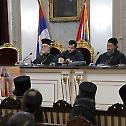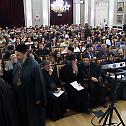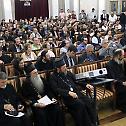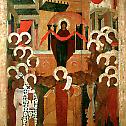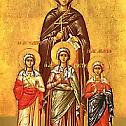Theology
Professor Christos Yannaras to speak аt Saint Steven’s Cathedral
2. November 2012 - 14:43The Western American Diocese and the Saint Steven's Cathedral are pleased to host Professor Christos Yannaras for a lecture on the theme "Religion and Church: Two Incompatible Realities?"
This event will be held on Sunday, November 4 at 6:00 p.m. at the Saint Steven's Serbian Orthodox Cathedral, 1621 West Garvey Avenue, Alhambra CA, followed by dinner and an opportunity for questions and answers. Questions on the topic of his presentation, as well as other topics the Professor often addresses such as "Crises of Economy" and "Salvation as an Individual or Communal Event" will also be welcome.
International Scientific Theological Symposium of Saint Maximus the Confessor in Belgrade
22. October 2012 - 10:53“Knowing the Purpose of Everything Through the Power of the Resurrection”:
The First Two Days
The St. Maximus the Confessor Symposium, “Knowing the Purpose of Everything Through the Power of the Resurrection,” co-hosted in Belgrade by the Belgrade Theological Faculty and the Orthodox Christian Studies Program of Fordham University, has begun with opening remarks by Bishop Maxim of Alhambra and the Western American Diocese, Patristics Professor at the Faculty and a Maximus scholar in his own right. Bishop Maxim introduced the new dean of the Faculty, Professor Predrag Puzović , who expressed his satisfaction at beginning his term as dean with such a grand event. He observed that St. Maximus is the “most universal spirit of his time and probably greatest thinker in the history of the Church. He has become the focal point of reference in modern Orthodox and Catholic dialogue.” The first church dedicated to St. Maximus, he noted, is in Serbia.
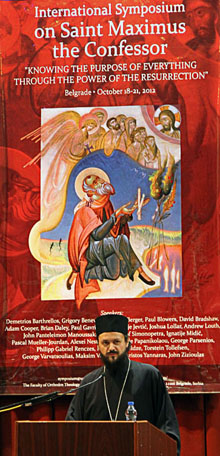 Bishop Maxim, chief organizer of the event, included in his welcome address, greetings to panelists and guests from His Holiness Bartholomew, Ecumenical Patriarch and His Holiness Irinej, Serbian Orthodox Patriarch.
Bishop Maxim, chief organizer of the event, included in his welcome address, greetings to panelists and guests from His Holiness Bartholomew, Ecumenical Patriarch and His Holiness Irinej, Serbian Orthodox Patriarch.
Ecumenical Patriarch Bartholomew, in his address, noted that “The Saints represent God’s gift to the world, precious beacons within the darkness of this transient world, and an example to be followed leading us to our final goal – the Kingdom of God.” Among these saints, who we commemorate this weekend, is the Confessor Maximus. Born in the sixth century and reposed in the seventh century, he, like all saints, belongs to the timelessness of the Kingdom of God, wherein we have him as a Heavenly intercessor before the Throne of Christ. The Ecumenical Patriarch highlight St. Maximus’s major contributions to theology in his address: his emphasis on love as the foremost of the virtues, his staunch defense of the two wills of Christ during the monothelite controversy, his distinction between the natural and the gnomic will, and his insistence that there is no natural evil, but the negligence of thoughts, from which stems mistaken actions and, important for a consideration of the contemporary ecological problem, the mistaken use of things that results from mistaken thoughts.
Rejoice, O Our Joy! Sermon on the Feast of the Protection of the Mother of God
15. October 2012 - 9:48We magnify Thee, O Most Pure Virgin, and we honor Thy Protection!
The spiritual protection and intercession before God, which we receive according to the great mercy and love that the Mother of God has for us, do we hymn today. For from the time that the Divine Sufferer and Savior of the world willed to give to the Mother of God as an adopted child the human race in the person of His disciple, St. John the Theologian, this protection has not ceased for a single day; and throughout all times and human history it has been this way—Mother and child! Penetrate these words with your thought; think upon their great depth of meaning, and on the most sacred kinship, purer and holier than which there is none on earth.
International Symposium on Saint Maximus the Confessor, October 18-20 Belgrade, Serbia
12. October 2012 - 12:44Holy Martyrs Faith, Hope and Love and Their Mother Sophia
2. October 2012 - 12:28In the reign of the Roman Emperor Hadrian (117-138) there lived a widow called Sophia which in Greek means "wisdom". She was a Christian, and in accordance with her name, she lived her life wisely. She had three beautiful daughters whom she called by the names of the three Christian virtues: the first was called Faith, the second Hope, and the youngest Love. She taught her daughters to live in u way pleasing to God by prayer, fasting and helping the poor. As the children grew in age, so also they grew in virtue, being obedient to their mother, They read diligently and knew well the books of the Prophets and Apostles; they were fervent in prayer and house-work. Their beauty combined with their virtuous lives attracted the attention of many.

